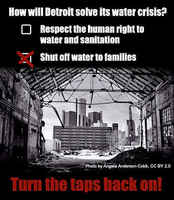Disconnecting water from people who cannot pay - an affront to human rights, say UN experts
Three UN experts on the human rights to water and sanitation, adequate housing, and extreme poverty and human rights expressed concern Wednesday about reports of widespread water disconnections in the US city of Detroit of households unable to pay water bills.
“Disconnection of water services because of failure to pay due to lack of means constitutes a violation of the human right to water and other international human rights,” the experts said. “Disconnections due to non-payment are only permissible if it can be shown that the resident is able to pay but is not paying. In other words, when there is genuine inability to pay, human rights simply forbids disconnections,” said Catarina de Albuquerque, the expert on the human right to water and sanitation.
The experts have been informed that a large-scale water shut-off for non-payment is happening in the City of Detroit, Michigan. The Detroit Water and Sewerage Department has been disconnecting water services from households which have not paid bills for two months, and has accelerated the process since early June, with the number of disconnections rising to around 3,000 customers per week. As a result, some 30,000 households are expected to be disconnected from water services over the next few months.
Because of a high poverty rate and a high unemployment rate, relatively expensive water bills in Detroit are unaffordable for a significant portion of the population.
Leilani Farha, the expert on the right to adequate housing, expressed concern that children are being removed by social services from their families and homes because, without access to water, their housing is no longer considered adequate. “If these water disconnections disproportionately affect African Americans they may be discriminatory, in violation of treaties the US has ratified,” Farha added.
“When I conducted an official country mission to the US in 2011, I encouraged the US Government to adopt a federal minimum standard on affordability for water and sanitation and a standard to provide protection against disconnections for vulnerable groups and people living in poverty. I also urged the Government to ensure due process guarantees in relation to water disconnection,” said de Albuquerque, renewing her call to the federal Government to take action.
According to international human rights law, it is the State’s obligation to provide urgent measures, including financial assistance, to ensure access to essential water and sanitation. “The households which suffered unjustified disconnections must be immediately reconnected,” the experts said.
(*) The experts: the Special Rapporteur on adequate housing as a component of the right to an adequate standard of living, and on the right to non-discrimination in this context, Leilani Farha, the Special Rapporteur on extreme poverty and human rights, Philip Alston, and the Special Rapporteur on the human right to safe drinking water and sanitation, Catarina de Albuquerque.
Leilani Farha is the UN Special Rapporteur on adequate housing as a component of the right to an adequate standard of living, and on the right to non-discrimination in this context. She was appointed in 2014. Ms. Farha is the Executive Director of the NGO Canada Without Poverty, based in Ottawa, Canada. A lawyer by training, for the past 20 years Ms. Farha has worked both internationally and domestically on the implementation of the right to adequate housing for the most marginalized groups, including on housing issues as the Executive Director of the Centre for Equality Rights in Accommodation (CERA). Learn more, log on to: http://www.ohchr.org/EN/Issues/Housing/Pages/HousingIndex.aspx
Philip Alston is the UN Special Rapporteur on extreme poverty and human rights. He was appointed in 2014 and is the John Norton Pomeroy Professor of Law at New York University. Mr. Alston has served the UN in several capacities including as UN Special Rapporteur on extrajudicial executions, Independent International Commission on Kyrgyzstan, Special Adviser to the UN High Commissioner for Human Rights on the Millennium Development Goals, chairperson and rapporteur of the UN Committee on Economic, Social, and Cultural Rights, and UNICEF’s Senior Legal Adviser on children’s rights. Learn more, log on to: http://www.ohchr.org/EN/Issues/Poverty/Pages/SRExtremePovertyIndex.aspx
Catarina de Albuquerque is the first UN Special Rapporteur on the right to safe drinking water and sanitation. She was appointed by the Human Rights Council in 2008. Ms. de Albuquerque is a Professor at the Law Faculties of the Universities of Braga, Coimbra and of the American University’s Washington College of Law. She is a senior legal advisor at the Prosecutor General’s Office. Learn more, log on to: http://www.ohchr.org/EN/Issues/WaterAndSanitation/SRWater/Pages/SRWaterIndex.aspx
For more information and press enquiries, please contact Madoka Saji (+41 22 917 9107 / msaji@ohchr.org ) or write to srwatsan@ohchr.org .
UN Human Rights, follow us on social media: Facebook: https://www.facebook.com/unitednationshumanrights Twitter: http://twitter.com/UNrightswire Google+ gplus.to/unitednationshumanrights YouTube: http://www.youtube.com/UNOHCHR Storify: http://storify.com/UNrightswire
Check the Universal Human Rights Index: http://uhri.ohchr.org/en


